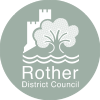- Aims and Objectives
- Background
- Rother Structure
- Food Hygiene in Rother District
- Service Delivery
- Resources
- Quality Assessment
- Ten Year Achievement
- Agreed and Approved
- Contacts
Aims and Objectives
This Food Service Plan is an expression of Rother District Council’s continuing commitment to Food Hygiene. The mission statement for this service is to
“Deliver an increasingly efficient and effective public health service which strives to promote and sustain a safe, prosperous community for businesses, residents and visitors.”
This plan has been prepared in accordance with paragraph 2.4 of the Food Law Code of Practice (2023).
- The purpose of this plan is to set out how Rother DC will deliver Official Controls within its area.
- This service plan notes paragraph 6 of The Regulators Code (published April 2014), which states that “Regulators should ensure their approach to their regulatory activities is transparent”.
- The food hygiene service of Rother DC is informed by the principles of:
- Proportionately (in applying the law)
- Consistency (of approach)
- Targeting (of enforcement action)
- Transparency (about how we operate and what those regulated may expect)
- The food hygiene service supports the vision of Rother DC Corporate Plan (2020 – 2027) “to put residents at the heart of all we do” by delivering an effective public health service to promote and sustain a safe prosperous community for businesses and residents. Corporate Plan 2020-2027 – Rother District Council
- Rother DC has adopted Equality Policies at Equalities at Rother District Council – Rother District Council. The Environmental Health Service conducts equality monitoring.
- The Better Regulation Delivery Office placed food hygiene at Number 5 in their five priority regulatory outcomes for England (November 2011).
Background
Rother District Council – Profile
Population: 93,100 (ONS UK 2021)
Area: 511.8 Km2
Rother’s District is mainly a rural area with urban centres: Bexhill, Battle and Rye. As a District Council, Rother’s hygiene service is concerned only with food hygiene; the food standards and feeding stuffs function is delivered by East Sussex County Council (Trading Standards).

The District of Rother contains small pockets of rural, coastal and urban living. The food businesses within the District reflects this mix. The coastal areas have a significant holiday industry and seasonal influx of visitors affects Camber and Rye in particular. Battle is a year-round tourist destination. Bexhill, the main urban development, has a significant care industry which is reflected in the high number of care homes. In rural areas there are food approved establishments associated with agricultural and fisheries sectors – one dairy, three cold stores, two egg packers, one meat preparation and two fish products.
Rother District Council Structure
flowchart TB
accTitle: Rother District Council Structure
accDescr: The structure of Rother District Council's members including committees, cabinet and the chief executive
A[Rother District Council \n Thirty-eight Elected Members] --- B[Cabinet]
subgraph Committees
C[Overview and Scrutiny Commitee]
D[Planning Committee]
E[Licencing & General Purposes Committees]
F[Audit and Standards]
G[Human Resources Committee]
H[Joint Waste and Recycling Committee]
end
A --- Committees
A --- I[Lorna Ford \n Chief Executive]
Decisions on this plan and all food hygiene policy matters are delegated to Cllr Field
Councillor details – Councillor Kathryn Field – Rother District Council (moderngov.co.uk)
Cllr Field makes policy decisions on food hygiene and communicates these to Mr R Parker-Harding, the Head of Environmental Health, Licensing and Community Safety.
The senior management structure (June 2023) is laid out on the chart below.
Senior management Structure Rother District Council – June 2023.
flowchart TB
accTitle: Rother District Council Senior Management Structure
accDescr: The structure of Rother District Council's senior manager, including the Chief Executive, Directors and Heads of Service
A[Lorna Ford \n Chief Executive] --- B[Duncan Ellis \n Interim Deputy Chief Executive]
A --- M[Ben Hook \n Director of Place and Climate Change]
subgraph deputy[Deputy Chief Executive]
direction LR
C[Gary Angell \n Audit Manager]
D[Mark Adams \n Head of Digital and\n Customer Services]
E[Gary Angell \n Audit Manager]
F[Chris Watchman \n Revenues and Benefits Manager]
G["Ola Janowicz (deputy s151) \n Interim Chief Finance Officer"]
H[Richard Parker-Harding \n Head of Environmental Services,\n Licensing & community Safety]
end
subgraph core[Corporate Core]
direction LR
I[Nicola Mitchell \n Corporate Policy & Projects Manager]
J[Lisa Cooper \n Democratic Services Manager]
K[Anna Evett \n Corporate Programme &\n Imporvement Manager]
L[Maria Benford \n Human Resources Manager]
end
subgraph place[Place and Climate]
direction LR
N[Joe Powell \n Head of Housing & Regeneration]
O[Deborah Keneally \n Head of Neighbourhood Services]
P[Kemi Erifevieme \n Development Manager]
Q[Jeff Pyrah \n Planning Policy Manager]
end
B --- deputy
A ---- core
M --- place
Rother District Council – Environmental Health Structure
flowchart TB
accTitle: Environmental Health Structure
accDescr: The structure of Rother District Council's Environmental Health Department
A[Richard Parker-Harding \n Head of Environmental Services, Licensing & Community Safety] --- B[Catherine Beaumont \n Deputy Head of Service \n Community Protection and Licensing]
A --- C[Una Kane \n Environmental Health Manager \n Food, Safety, Pest & Dog Control and Licensing]
B --- D[Five Senior Environmental Health Officers \n Three Licensing Officers \n Seven Pollution Control Officers \n Three Business Support Clerks]
C --- E[Nine Senior Environmental Health Officers \n Two Pest Control Officers \n Two Business Support Clerks \n Stray Dog Control Contract]
D --- F[Apprentice Environmental Health Officer]
E --- F
The food hygiene of Rother’s District is carried out by the members of the Food Safety team (FAST), as part of the shared environmental health service and interlinks with UKHSA (United Kingdom Health Security Agency – formerly Public Health England) neighbouring local authorities, Food Standards Agency and other agencies as shown below;
The function of the team, in addition to food hygiene, is to advise on health and safety at work, investigate notifiable infectious diseases, regulate skin piercing, licence holiday and residential caravan sites, licence kennels and catteries, provide pest and dog control service and risk assess private water supplies.
The team operates from Town Hall, Bexhill-on-Sea and Vicarage Lane, Hailsham from 8.30am – 5.00pm Monday to Thursday and 4:30pm Friday. The service operates an agile working system. Planned out-of-hour work is undertaken and emergency calls are received by a standby system operated on our behalf by Cornwall Council on 01424 787868.
Any complaints can be submitted to Rother DC website at Environmental Health – Rother District Council or reported by telephone 01424 787500.
Enforcement Policy
Rother DC adopted an Enforcement Policy for the shared Environmental Health service in October 2014, cabinet minute 14/31, is available at
Rother and Wealden District Councils Shared Environmental Health Service Enforcement Policy 2014
The Environmental Health service standards and this service plan can be found at Service standards – Rother District Council
Food Hygiene in Rother District
The profile of food businesses in the Rother district on 31 March 2023:
| Type of Business | Number |
|---|---|
| Caring Premises | 117 |
| Distributor | 14 |
| Hotel/Guest House | 56 |
| Importer | 1 |
| Manufacturer | 35 |
| Mobile | 38 |
| Producer | 35 |
| Pub/Club | 107 |
| Restaurant/Cafe | 203 |
| Caterer | 128 |
| Retailer | 80 |
| School/College | 54 |
| Small Retailer | 81 |
| Supermarket | 13 |
| Takeaway | 45 |
| Total | 1007 |
| Unrated | 12 |
Each year the numbers of food businesses varies – the total of 1007 is higher than previous years, mainly due to the explosion of home catering businesses during the pandemic. Unrated food businesses are those that have applied to be registered but are awaiting their first inspection.
There is a constant churn of registered food businesses, in 2022-3 eighty-four businesses ceased trading and seventy-six opened for the first time.
The service does not inspect each food business annually, instead it inspects according to risk and performance to make sure that the highest risk and the lowest performers receive the most attention.
Food Hygiene Intervention Ratings
The Food Standards Agency sets out a numerical scheme which local authorities must use at each food hygiene inspection and this is used to determine;
- When the next intervention will be (date)
- What the next intervention will be (inspection/partial inspection/alternative)
- Food hygiene rating
This numerical assessment of the business is based on the hazards, risks and controls. These figures are entered into the database and the next inspection is planned. The same information is used to create the food hygiene rating to inform customers of the general standards within a food business.
A business that produces high risk food with good controls is seen once between twelve to eighteen months. This intervention frequency will increase to once in six to twelve months if the business serves a vulnerable group (elderly/infirm/young). Any business with poor controls will require the most attention as decided by the inspecting officer. All food hygiene inspections fall into one of these categories;
- Category A and B (92+; 72+)
These are the highest risk food businesses and must be subject to an inspection, partial inspection or audit at least every six months (A) and every 12 months with (B). It is Rother’s policy that these businesses are fully inspected. - Category C (52-71)
These medium risk businesses will receive an inspection, at eighteen months, if they are broadly compliant it will be a partial inspection; otherwise a full inspection will be made. - Category D (31+)
Category D premises are subject to an intervention every 24 months. Where they are rated 30 or 40 for “type of food”, these businesses must be subject to inspection, partial inspection or audit. Where the premises are rated less than 30 for type of food etc. it can alternate between official controls. Rother District Council inspects all category D’s, partial inspections for those that are broadly compliant. - Category E (0-30)
The FSA advice on these lowest risk food businesses is that they could have an intervention every 36 months. It is Rother DC policy that these lowest risk food businesses are subject to a physical inspection or an alternative enforcement questionnaire every 36 months. It is important to retain observation of these lowest risk businesses to prevent minor issues becoming major over a long intervention interval.
Food Hygiene Rating Scheme
The food hygiene rating scheme was adopted by Rother DC in April 2011 to provide information to consumers on the hygiene, structure and management of a food business. At the end of an inspection the business is rated with one of the window stickers below. In England it is not a legal requirement to display FHR stickers, although it is in both Wales and N Ireland. Rother ratings are available at Search the Rother area | Food Standards Agency
Business with a 3, 4 or 5 are deemed to be broadly compliant with food hygiene legislation and those with ratings of 0, 1 or 2 have failed.

In April 2023, 99 % of food businesses in Rother were broadly compliant with food law. Distribution of Food Hygiene Ratings – Rother District Council
Food Hygiene Ratings April 2023 RDC
| Rating | April 2023 | April 2022 |
|---|---|---|
| 0 | 0 | 0 |
| 1 | 4 | 2 |
| 2 | 2 | 1 |
| 3 | 43 | 44 |
| 4 | 88 | 119 |
| 5 | 768 | 762 |
| Broadly Compliant | 99% | 99% |
While the overall performance is excellent at 99%, it is notable that there are twenty-three fewer food businesses with food hygiene ratings in 2023. This reflects officer experience – the cost-of-living crisis is causing businesses to close. Officers found trading businesses cut costs which created hazards e.g., restricting use electricity and gas, reducing cleaning (reduction in staff costs), terminating contracts for waste collection, pest control.
Food Hygiene Interventions – Performance 2022-2023
A total of 410 food businesses were due for an intervention in 2022-3 plus 61 inspections which had not been done in 2021-2. Of the 410 due inspections, all but four were done, giving a performance of 99%. All outstanding inspections from 2021-2 were also completed.
The annual performance of the Food and Safety Team has restored to pre pandemic standard, as shown below.
During 2022-3 seventy-six food businesses closed and eighty-four new food businesses opened. Each new business was visited to ensure they received the support and advice needed to operate safely.
As planned in 2022-3 an alternative enforcement strategy (AES) was adopted for fifty-four of the very low risk food businesses. These businesses were contacted electronically and asked to complete an online survey about their hygiene arrangements. The vast majority gave satisfactory answers, those that did not were visited by an officer and if they were trading, they received a full inspection. Considerable time was spent in establishing contact with very low risk businesses, many do not inform the local authority when they cease trading.
Service Delivery 2023-2024
Rother DC is committed to providing a full food hygiene service as follows;
For the year 2023-4 the total number of food premises due for inspection is four hundred and seventy. These inspections are categorised as follows:
| Category | Number |
|---|---|
| Category A | 0 |
| Category B | 66 |
| Category C | 93 |
| Category D | 192 |
| Category E | 119 |
| TOTAL | 470 |
| Carried forward from 2022 -23 | 4 |
The food hygiene interventions are conducted to ensure the food business meets the requirements of food hygiene law. It is Rother DC’s policy that these planned inspections are given priority and that 98% of this planned programme will be completed.
Our Approach
It is ROTHER DC policy to make food hygiene inspections without appointment. The Environmental Health Officer will identify themselves to the food business owner (or person in charge) before starting the inspection. The intervention will be conducted in accordance with the Food Law Code 2023 in particular:
- The hazards and risks will be assessed
- The controls will be verified
- The businesses validation will be examined
- The findings will be discussed
- A report of visit form will be left
- A follow up letter may be issued
The Environmental Health Officers of Rother DC will also deal with licensing and health and safety issues during a food inspection.
Poorest Performers
In Rother DC food businesses scoring 0-2 will receive more attention and support to continue to raise standards. This means that inspectors will make compliance checks (revisit) within three months of the initial inspection. If significant improvements have not been made Inspectors will take enforcement action.
Those businesses which show little or no improvement may be advised to contact a training contractor for tailored coaching, which they will have to pay for.
Enforcement
In 2022-3 eight enforcement notices were issued to seven food businesses. These hygiene improvement notices required the completion of improvement works by a specified date. All were complied with. In one case when an officer was arrived to make their inspection, he realised that the food handlers were continuing to serve food, while the kitchen sink was discharging onto the kitchen floor. The business agreed to voluntarily close while the necessary repair was undertaken, and the entire kitchen deep cleaned.
Seasonal Businesses
There are many seasonal food businesses within the Rother district who trade only between June and September or early December. These businesses are inspected according to the Food Standards Agency food hygiene intervention scheme (as 4.2 above). However, those categorised as C are scheduled for an intervention at 18 months which may fall within their closed period. In these cases, it is policy to bring these inspections forward, so they are inspected when they are trading.
Unrated Businesses
A business is unrated when it is registered with the local authority but is awaiting the first inspection. On 31 March 2023 there were twelve unrated food businesses on the database.
Revisits
Twenty-nine revisits were made in 2022-3. Revisits are made to any businesses where significant statutory requirements were found on the programmed inspection. Revisits are always made after the expiry of statutory notices and to any businesses rated 0-2 FHRS. Revisits may also be made at the discretion of the EHO. The number of revisits varies every year, as can be seen below.
Food businesses with a 3 or 4 who wish to improve their score may apply for a revisit without charge after a three-month period or with charge once the work has been completed. Food Hygiene Rating Scheme – Information for Food Businesses – Rother District Council
Service Requests
Complaints about foodstuffs, food businesses or handlers can be made directly to Rother DC by emailing foodhs@rother.gov.uk or by telephone to 01424 787550.
We do not accept anonymous complaints, full contact details will be asked for, which will be kept confidential. The team will observe the shared service complaint investigation policy, give a first response to a service request within 5 days and complete the investigation within 90 days. In 2022-3 Rother DC investigated one hundred and forty-seven requests for service regarding foods, food hygiene and food safety in food businesses.
New Businesses
Seventy-six new food businesses opened in Rother in 2022-3. Each of these businesses was given advice and guidance on both food hygiene and safety matters.
Every new food business is obliged to register with their local authority and this form is available on the Rother DC website along with full advice on starting up a new food business. Starting a food business – Rother District Council
Sampling
Rother DC samples food to ensure it is clean and safe to eat. Food samples are taken and sent to United Kingdom Health Security Agency (UKHSA) in Porton Down for examination.
In 2022-3 thirty-two food samples were taken from food businesses trading in Rother. Some of the samples were part of UKHSA national studies into pork scratchings, hygiene and sandwiches, plant-based alternatives, hot and cold smoked fish, sushi/sashimi. Swabs were taken in kitchens serving food to the public to check cleaning was satisfactory. Eight samples were unsatisfactory – the businesses were informed of the results and advised on improvements to cleaning/handling/storage.
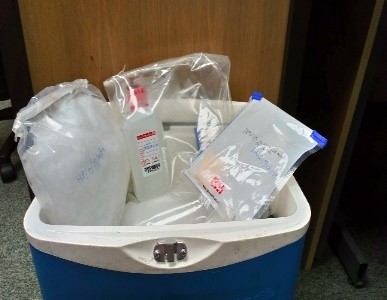
Primary Authority
Primary Authority allows businesses to be involved in their own regulation. It enables them to form a statutory partnership with one local authority which then provides robust and reliable advice for other local regulators to consider when carrying out inspections or addressing non-compliance. Rother DC does not act as a primary authority for any food business. Rother DC complies with the primary authority principle by checking the appropriate website before conducting food hygiene inspections and noting any assured advice or inspection plans.
Import/Export of Food
Since 1st January 2021 certification of food before export into Europe is required. This means that every consignment of food must be inspected and certified by an Environmental Health Officer before export. This is a distinct issue for those businesses exporting fish from Rye to Europe. Chapmans of Rye and the Environmental Health Service of Rother and Wealden worked together to establish an export hub which serves the fishing communities of Sussex, Kent and Essex.
Fish from Sussex, Kent and Essex is collected by road, transferred to Rye where it is inspected and dispatched. One export health certificate is issued. This allows for rapid transit at the border control post and minimises the cost to all involved. One local authority, Rother District Council, provides the EHC.
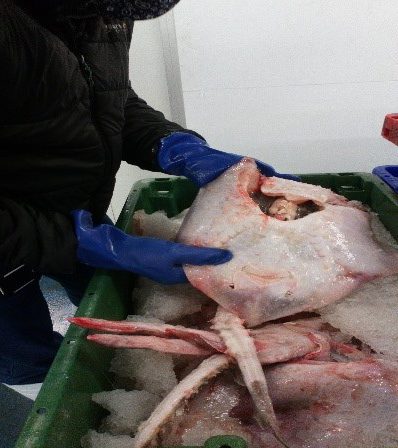
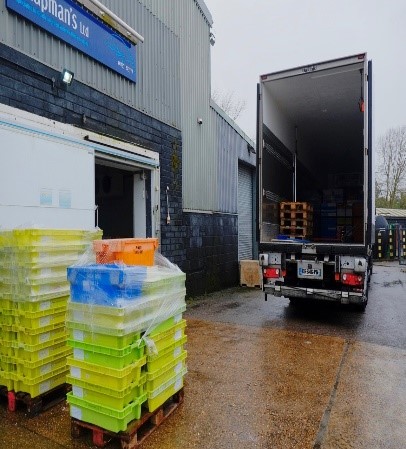

Photographs show – inspection of fish by EHO; prepared pallets of fish ready to be loaded; seal on vehicle ready to go.
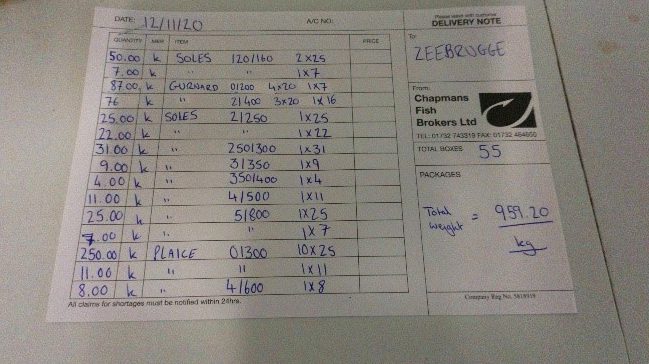
Before 1st January 2021 fish exported to France and Belgium was listed on a single document, as in photo above.


Between 1st April 2022 and 31st March 2023 eighty-five export health certificates were issued for fresh fish destined for Europe. Each certificate was charged at £100.

Consignment of fish being packed for export on Simmons Quay Rye
Notifiable Diseases
In 2022-3 Rother DC received two hundred and twenty notifications of infectious diseases from UKHSA. Once notified, each case is contacted with advice about their illness to prevent further spread. E. coli 0157, Salmonella and Shigella are the most serious food borne illnesses – we interview these cases and give advice encouraging changes in behaviour to prevent further infections. In very rare cases, we will exclude infected persons from work. There were no outbreaks nor exclusions in 2022-3.
| Reportable Diseases | 2022/23 | 2021/22 | 2020/21 |
|---|---|---|---|
| Campylobacter | 176 | 106 | 128 |
| Covid 19 | 0 | 44 | 9 |
| Salmonella | 18 | 12 | 10 |
| E. coli 0157 | 12 | 11 | 10 |
| Shigella | 0 | 4 | 0 |
| Giardia | 16 | 3 | 1 |
| Cryptosporidium | 0 | 0 | 1 |
| Total | 222 | 180 | 159 |
Food Alerts
Food hazard warnings are responded to in accordance with the Food Law Code 2023 and with written procedure. There were no food alerts for Rother District Council action in 2022-3.
Advice for Food Businesses
Rother District Council is committed to supporting all food businesses through provision of food hygiene advice on the Rother District Council’s website at Food Hygiene for Businesses – Rother District Council
Business advice is provided at Support and advice – Rother District Council
Resources
| Area | 2023-24 Budget |
|---|---|
| TOTAL cost | £139,040 |
| Employee Costs | £131,140 |
| Supplies and Services | £7,000 |
| Staff | 2.5 FTE |
| Budget Area | £ | Notes |
|---|---|---|
| Sampling Budget | 9,948 | With UKHSA not ROTHER DC |
| Legal Action | 1,000,000 | For general Council disasters and emergencies – not specific to food hygiene functions |
| 9,420 | Specifically, for food hygiene matters |
The number of full-time equivalent staff working on food hygiene, including supervision and management, for 2023-4 is 2.5 FTE. All the authorised food officers are named below.
Note EHORB indicates Registration with the Environmental Health Officers Registration Board.
| Environmental Health Officer | Additional Qualification | Level of Authorisation Inspection | Level of Authorisation Enforcement |
|---|---|---|---|
| EDWARDS Simon | EHORB Registration Env Health Degree | A-E | Full |
| HOYLAND Richard | EHORB Registration Env Health Degree | A-E | Full |
| KAMUNDA Maybee | EHORB Registration Env Health Degree | A-E | Full |
| KANE Una | EHORB registration Env Health Degree MSc (Applied Micro) | A-E | Full |
| OGINNI Oladayo | EHORB Registration Env Health Degree | A-E | Full |
| PIPER Richard | EHORB Registration Env Health Degree | A-E | Full |
| POWELL Jamie | EHORB Registration Env Health Degree | A-E | Full |
| SIMMONDS Rachel | EHORB Registration Env Health Degree | A-E | Full |
| WHITCOMBE Ann | EHORB Registration Env Health Degree | A-E | Full |
| WRIGHT Philip | EHORB Registration Env Health Degree | A-E | Full |
Other Officers, within the Environmental Health Department (but not within the Food and Safety team), who are authorised are as follows:
| Surname | First Name | Job Title |
|---|---|---|
| PARKER-HARDING | Richard | Head of Environmental Health |
| RANDOLPH | Mark | Senior Environmental Health Officer |
| BEAUMONT | Cathy | Deputy head of Environmental Health |
The Council employs two Pest Control officers who assist officers in inspecting premises for pest activity and acts as expert witnesses in prosecutions.
Database
During 2022-3 the existing M3 database was replaced by Idox Cloud. The Environmental Health Manger provided training for all members of FAST, including written procedures
Staff Development
The shared Environmental Health service between Wealden and Rother has created resilience, improving collective knowledge and experience.
Annual appraisals are conducted to identify training needs which form an annual training programme. For 2023-4 training will be directed towards the use of the new cloud-based database, Idox Cloud. Every member of the team also attends external seminars, to progress their professional knowledge and self-development.
During 2022-3 team meetings were usually held every six weeks predominantly in person, except for the poor weather in December. Senior managers have attended at least one team meeting during 2022-3. Full notes of meetings are available on the internet library FAST Team Meetings | RIAMS
Those officers outside Food and Safety Team were invited to some meetings to learn about new working procedures, specifically on use of the new database Idox Tascomi. Officers from outside the team do not conduct food hygiene inspections unless they have completed the required training and are up to date with food and safety procedures and policies. Newly qualified officers are subject to competency assessment using the FSA Competency Framework.
Sussex Food Liaison Group Meetings
Rother DC is represented on the Sussex Food Liaison Group by the Environmental Health Manager. This liaison work ensures that our enforcement activities are consistent with those of our neighbours.
In 2022-3 the food and safety team participated in two consistency exercises; these are blind tests designed to ensure that individual officers are consistent with scoring. May 2022 – a local scenario and in November 2022 – a national exercise set by the FSA. The team score was generally consistent both locally and nationally.
Rother is represented on the CIEH Sussex Branch of the Food Study Group, and UKHSA meetings on infection control.
Quality Assessment
Each year Rother DC’s performance against this plan is measured, using all the specified targets, standards and any targeted outcomes within this plan. The review will specify where there has been variance from the plan and the reason for that variance. Any areas in need of improvement will be specified and an action plan put in place to implement their improvement. For 2023-4 the food programme is up to date. The target is to complete 98% of the planned programme by 31 March 2024.
The service subscribes to RIAMS, Food | RIAMS an on-line Environmental health library service, providing links to national advice and guidance for Environmental Health practitioners. In addition, there is material available on the FSA’s website and their communications hub. There is also a library of law encyclopaedias and reference books in the office.

Ten Years Achievement
The shared service between Rother Environmental health and Wealden Environmental Health began in January 2013. The food hygiene rating system had been adopted by both Rother and Wealden in 2011, with caterers initially followed by retailers and others at later dates. This marriage between the two Environmental health departments has been very successful. Resilience has been greatly improved, new workstreams introduced (certification of food for export), knowledge increased.
The most dramatic demonstration of the success of the shared service has been the improvement in food hygiene ratings. In January 2013, the number of food businesses in Rother with a rating of five very good was 146. This figure in April 2023 is 768.
Agreed and Approved
This Service Plan has been approved by the Head of Service, following consultation with the Cabinet Portfolio Holder.
It is published on the Rother website and in the Member’s Bulletin.
Signed: R Parker-Harding
Mr R Parker-Harding BSc (Hons) MSc DMS CEnvH AMIOA
Chartered Environmental Health Practitioner
Head of Service-Environmental Services, Licensing and Community Safety
Date: 17/07/23
Signed: K Field
Councillor K Field
Cabinet Portfolio Holder Environmental Health
Date: 28 July 2023
Contacts
Website: www.rother.gov.uk
Address: Town Hall, Bexhill-on-Sea
Telephone: 01424-787550
E-mail: foodhs@rother.gov.uk
